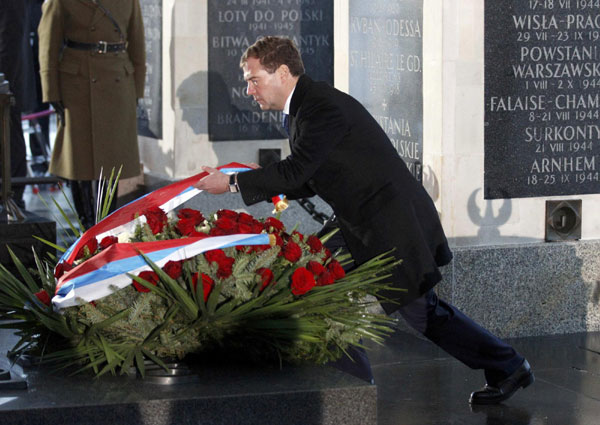Diplomatic and Military Affairs
Medvedev trip to Warsaw helps Polish-Russian reset
Updated: 2010-12-07 04:13
(Agencies)

Russia's President Dmitry Medvedev lay a wreath at the Tomb of the Unknown Soldier in Warsaw Dec 6, 2010.[Photo/Agencies] |
It's been eight years since a Russian president was last in Warsaw for political talks, and Medvedev and his Polish counterpart, Bronislaw Komorowski, hailed the visit as a significant step forward. They also oversaw the signing of several deals meant to intensify political, economic and cultural contacts.
"Today is a great day in Polish-Russian relations," Medvedev said. "The spirit of our relations is changing."
"For a very long time the ghosts of the past loomed over those relations. It doesn't mean that the past has disappeared, it doesn't mean that there are no issues linked to the past that would remain," Medvedev said. But "it is important that we are starting again to listen to one another. That we are ready to discuss the most difficult, the darkest and most weighing pages in our mutual history."
Polish memories remain strong of Moscow's invasion of Poland's eastern half in 1939 and its dominance of the country during the Cold War. More recent sources of friction have stemmed from Poland's support for the pro-Western Orange Revolution in Ukraine in 2005 and its acceptance of a Bush-era plan for a US missile defense base in Poland _ a project that outraged Russia but which President Barack Obama has since scaled back.
But several issues have proven a catalyst in recent months for a thaw. Russia has begun showing remorse for a 1940 massacre of about 22,000 Polish army officers and other prisoners of war. Known as the Katyn massacre, it has long been an open wound because during the Soviet era the deaths were falsely blamed on the Nazis and in recent years Moscow has avoided acknowledging Soviet guilt.
A significant step in Moscow's new approach came more than a week ago when the Russian parliament passed a resolution acknowledging that the crimes were ordered by Stalin and expressing "deep sympathy for the victims of this unjustified repression."
In Warsaw, Medvedev said he will continue on that path of disclosure.
"We should know the truth," Medvedev said. "We all need it _ the Poles and, to no lesser degree, the Russians, because our history is linked to tragic events that made huge numbers of people suffer."
Also, the death of Polish President Lech Kaczynski in Russia this year along with dozens of Polish dignitaries triggered an outpouring of sympathy from Russians that was appreciated by a nation plunged in its deepest mourning in decades.
"The bad drought in Polish-Russian relations has come to an end," Komorowski said at a news conference held after the deals were signed in the elegant presidential palace.
One of the deals signed is a broad declaration to deepen and diversify trade and economic cooperation far beyond a relationship that now is based mainly on Poland importing gas and oil from Russia. The declaration stresses the need to modernize the Russian economy and society.
Other deals specify more cultural contacts, youth exchanges and infrastructure development, as well as joint work in fighting pollution in the Baltic Sea.
"I am sure that this visit, this long-awaited visit, will give our relations a new dynamic," Medvedev said. An opinion poll made on the eve of his visit showed that 93 percent of Poles expected it to improve the relationship. Medvedev referred to those expectations and said, "We don't have the right to let them down."
Medvedev's visit to Warsaw comes amid a push by Russia to modernize its economy and to improve its standing with Western powers, including the European Union and NATO. Russia's strained relationship with Poland has long been an irritant in its dealings with Europe and Russian officials have said they recognize that Poland is an important member of both groups and hope a Russian-Polish friendship would strengthen links.
Komorowski said that Poland, as a member of both the EU and NATO, wants to help build those bridges.
"We also want in this way to influence the general direction of EU and NATO policies in relations with our important neighbors to the east," he said.
The presidents also said they plan to jointly oversee the creation of a permanent memorial to President Kaczynski and the 95 other victims in Smolensk, Russia, where they died in the April 10 plane crash.
The visit contained other symbolic gestures. Medvedev presented the Russian Order of Friendship to Andrzej Wajda, the Oscar-winning Polish film director who made a film about Katyn. The director's own father was an army officer killed in that massacre.
At a evening dinner, Medvedev delivered a toast expressing regret that there was eight-year hiatus since the last visit of a Russian president to Poland and invited Komorowski to Moscow.
E-paper

Ear We Go
China and the world set to embrace the merciful, peaceful year of rabbit
Preview of the coming issue
Carrefour finds the going tough in China
Maid to Order
Specials

Mysteries written in blood
Historical records and Caucasian features of locals suggest link with Roman Empire.

Winning Charm
Coastal Yantai banks on little things that matter to grow

New rules to hit property market
The State Council launched a new round of measures to rein in property prices.
